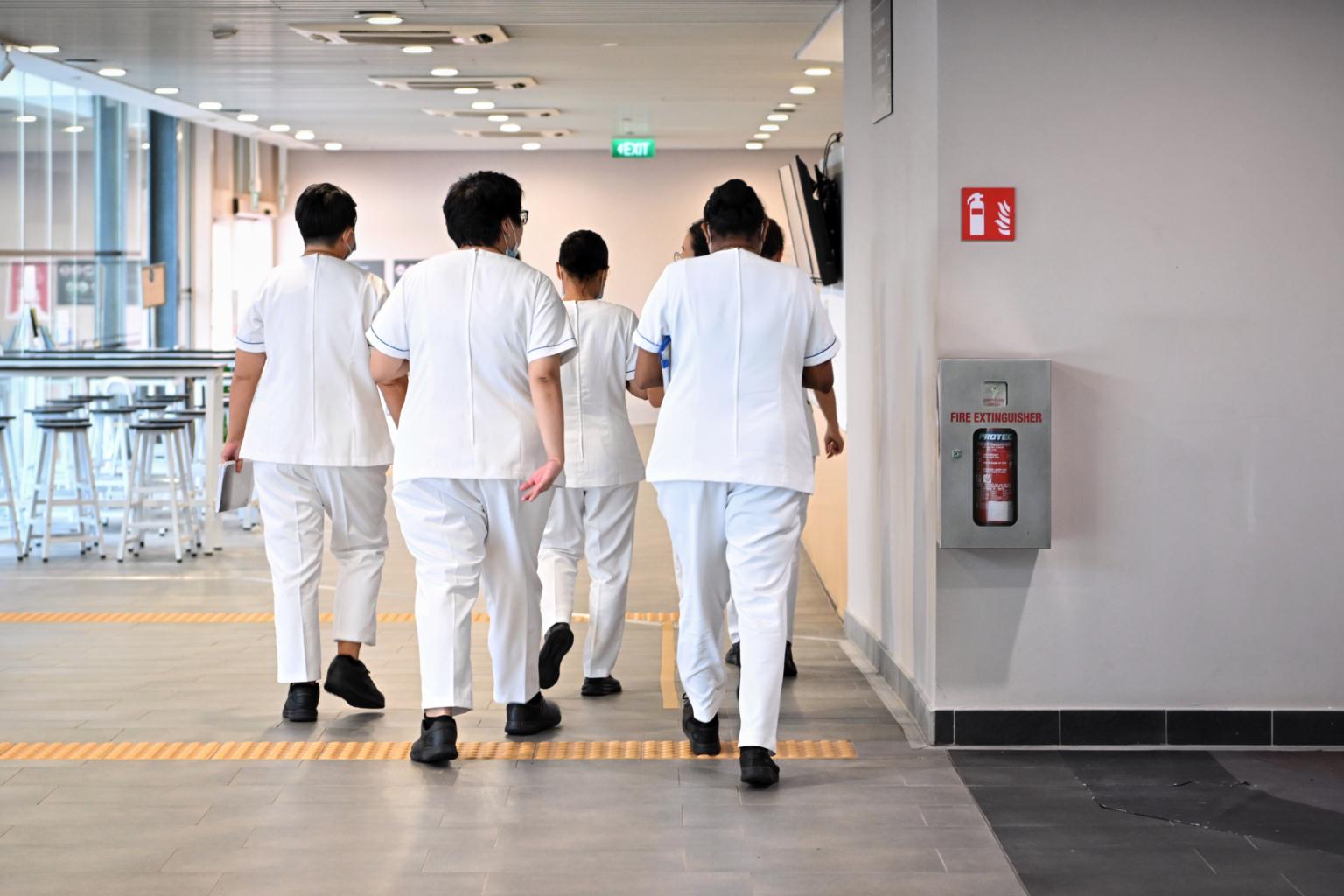24k more nurses, healthcare staff needed by 2030 as S'pore ages
Sign up now: Get ST's newsletters delivered to your inbox

While locals will continue to form the bulk of the nursing workforce, the number and role of foreign nurses will grow.
ST PHOTO: KUA CHEE SIONG
SINGAPORE - With the number of elderly Singaporeans on the rise, a system to care for the aged is set to become a critical part of the nation's healthcare landscape.
The new initiative to prevent illnesses and keep the citizens healthy is a move in that direction, Health Minister Ong Ye Kung told Parliament on Wednesday.
"Healthier SG is a key effort to activate and reform the public health system, empower individuals to choose health, and lay the foundation for the aged care system," he said.
One key challenge is to find enough foreign nurses to supplement local ones to care for the elderly.
Mr Ong said nurses, allied health professionals and support care staff are needed to operate hospitals, clinics and also eldercare centres.
"They number 58,000 now and MOH (Ministry of Health) estimates that this will need to grow to 82,000 by 2030," he added.
He also pointed out that by 2030, one in four Singaporeans will be aged 65 and above, up from one in six today.
In his closing speech on the debate on the Healthier SG White Paper in Parliament, Mr Ong underlined the need to prepare for a rapidly ageing population from a healthcare perspective and also the urgency to attract foreign nurses, who are in high demand globally but are also critical in making the aged care system work.
He said Singapore's healthcare system is not one system but three interconnected systems working together to deliver good health.
The first is the acute care system, comprising hospitals and emergency departments, where people were treated when they get very sick.
Then there is the public health system, which includes the control of infectious diseases such as Covid-19, as well as population health, which is being beefed up through Healthier SG.
The third one is the aged care system, which is not just about nursing homes, which continue to be built, but also enabling seniors to age in the community.
"In our Asian culture, we value caring for our seniors at home. Our seniors also prefer to age in a familiar environment. We should not lose this," said Mr Ong.
"As a society, we must guard against the assumption that seniors will always become sick and frail, and unable to take care of themselves."
An estimated 97 per cent of seniors above 65 can either live independently or with some help in the community today.
Mr Ong also alluded to research showing that the health impact of loneliness for a senior is the equivalent of smoking 15 cigarettes a day.
"We must maintain or improve that share, and not inadvertently give them that equivalent of 15 cigarettes a day, and weaken their health and ability to live independently," he said.
But he also pointed out that an expanding aged population needs more healthcare. And since there simply are not enough local nurses available for this, Singapore will have to rely on more foreign nurses.
Replying to several MPs, including Ms Mariam Jaafar (Sembawang) and Mr Dennis Tan (Hougang), who had raised issues on manpower, Mr Ong said there has been no exodus of local nurses, and that efforts are afoot to raise the intake of nursing students locally to 2,300, from 2,100 currently.
While locals will continue to form the bulk of the nursing workforce, the number and role of foreign nurses will grow.
"If we want to take care of our seniors and the sick, if we want to reduce the workload of healthcare workers, we must expect foreign healthcare workers to play a bigger role in the coming years," said Mr Ong.
"This is especially so in areas that are facing a bigger manpower crunch, like aged care or palliative care."
In response to Nominated MP and breast surgeon Tan Yia Swam's suggestion of granting permanent residency to the good performers, given the heightened international competition for nurses, Mr Ong said MOH is supportive of this.
The Immigration and Checkpoints Authority assesses permanent residency applications holistically and will certainly consider the important contributions of healthcare workers, and MOH's support for foreign healthcare workers, when evaluating their applications, he said.
Singaporeans and permanent residents make up about 72 per cent of Singapore's pool of registered nurses and 63 per cent of enrolled nurses. The rest are from the Philippines, Malaysia. China, India, Myanmar and other countries.
Mr Ong said MOH will broaden training for existing nurses, allied health professionals and pharmacists so that they can take on crucial roles alongside doctors.
For example, community nurses will be trained in lifestyle coaching to help residents make good choices according to their care needs, he said.
There are also plans to train community pharmacists, who can already provide smoking cessation and weight management services, in influenza vaccination.
"But first, there must be enough people to train," he said,
Meanwhile, Dr Janil Puthucheary, Senior Minister of State for Health, in his reply to Mr Xie Yao Quan (Jurong) and Ms He Ting Ru (Sengkang), said Singapore is trying to grow its pool of family physicians to meet its target of 3,500 by 2030.
Overall, about 200 overseas-trained Singaporean doctors come back every year, he added.


